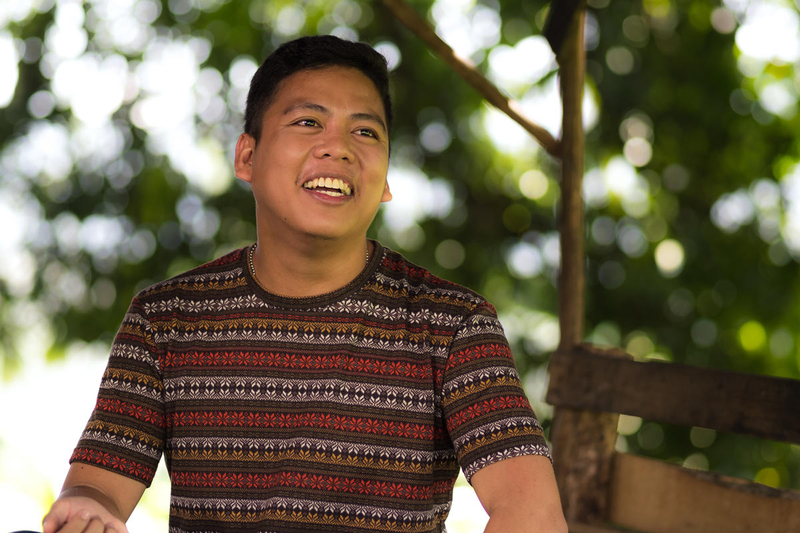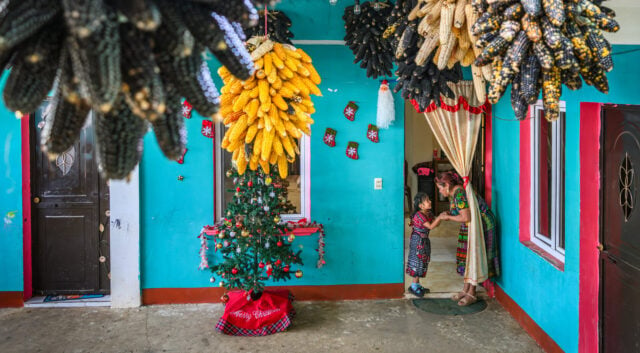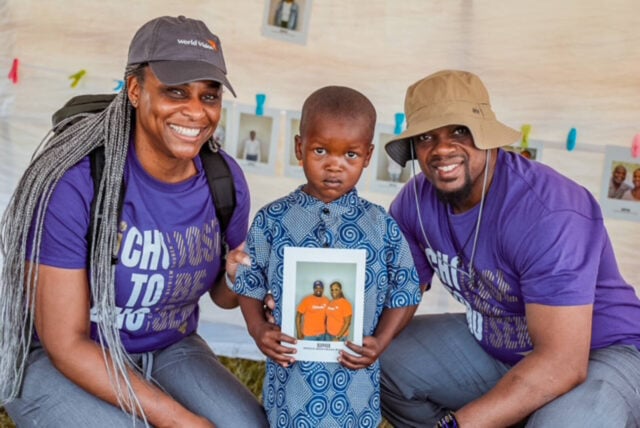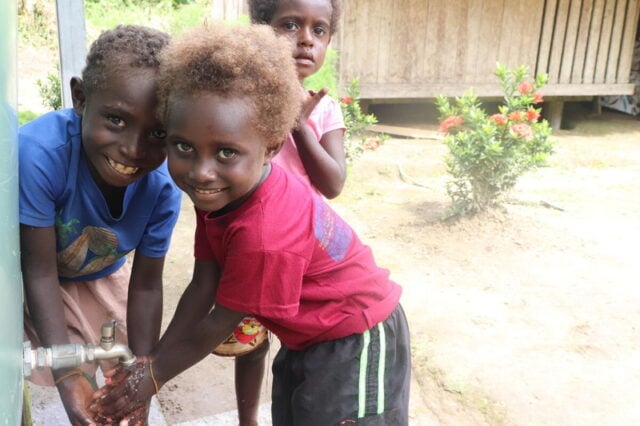When Janvie Amido first arrived in Misamis Oriental in the Philippines, he was hiding under his mother’s blanket.
Born in Iloilo, Philippines, the then 7-year-old accompanied his mother, grandmother, and younger brother to the port where they would set sail for the province of Misamis Oriental. Their northern destination was home to his grandparents, and his mother, Angeles, hoped a visit might reveal new opportunities for her and her husband, Catalino, to provide for their nine children. Together, they’d planned for Angeles to return with her mother for a few months, bringing their youngest child, Aaron, along, to scout a potential resettlement.
But when Janvie realized he was about to be left behind, a tearful scene ensued.
“I was crying super, super loud,” recalls Janvie, now 27, with a laugh. “And the people were wondering, ‘Who’s that child and why is he crying?’”
While his mother attempted to soothe him, sympathetic bystanders suggested she let him board the boat with her, at least until it was time to say goodbye. She did, but when the moment came to part ways, Angeles made a split-second decision and hid Janvie under her blanket instead.
“She was just hiding me down there during the ticket inspection,” says Janvie. “She was saying, ‘There is no one here, only the three of us. There is no Janvie.’”
Months later when she returned to Iloilo, Angeles would deny Janvie’s presence again. But this time — it wouldn’t be a lie.
Abandoned
Today, Janvie is hard to miss. The 27-year-old is slight in stature, but his fast-paced speech, quick wit, and ubiquitous laugh make his presence in a room undeniable.
And working a room is, in fact, just one of many things he excels at. With more than a decade of public speaking under his belt, Janvie has a way of connecting with people. He chats easily with everyone, flashing a warm, wide smile and laughing with the kind of familiarity that makes you feel like an old friend.
As he tours around modern-day Misamis Oriental, he walks purposefully, pointing out the differences between this version and the one he first encountered in 1997.
Today, roads lined with utility poles carry currents up through the mountains, winding past sprawling production plants like the one that sits exactly where his grandparent’s home once did. When they lived in this community, tucked high above a bustling Cagayan de Oro City, it lacked roads, electricity, and most noticeably for Angeles — jobs.
“I was really expecting [that] this was going to be a place where the experience might be different,” says Janvie. “That there might be greener pastures.”
But back then, his grandparent’s home in the mountains was too isolated. The delivery of government services and development of infrastructure lagged, keeping companies that could otherwise create job opportunities from establishing themselves in the area.
Only a few short months after arriving all those years ago, Angeles decided to return home to Iloilo — without Janvie.
“I was just thinking that they were going to the market to buy something,” says Janvie of his mother and brother. “They didn’t tell me that they were [going] back to Iloilo. They just left me behind.”
At only 7 years old, he was abandoned — left to live with grandparents he barely knew, in a foreign place he’d only wound up in because he’d wanted to stay with his mother.
“There was no letter. There was no communication. There was nothing from them,” he says of the months and years that followed. “I didn’t [know] if I still had that parental love coming from them — if they really loved me.”
More than 20 years later, the wound is still raw. Although he eventually reconnected with his parents — 16 years after the fact — Janvie admits the years of silence have yet to be explained.
“Even now, I am still trying to understand that situation,” he says. “For that entire 16 years, why was there no communication? Even asking, ‘How are you now? Are you in school? Are you doing well?’”
But a young Janvie had no time to search for answers. Instead, he focused on moving forward with his new life.
“During that time, I didn’t feel any transition,” he says. Instead, he coached himself: “Like, ‘You have no option, so whether you like it or not, you have to live here and that’s all.’”
Hardships in everyday life
In the months that followed, Janvie tried settling into life with his grandparents, Concordio and Estelita Soquena. When they first took Janvie in, the trio’s relationship was nothing less than awkward.
“I’m really talkative,” says Janvie. “Like, what I feel I want to say, I’m going to say it right away. And I could do that with my parents.”
But communicating with his grandparents was different. The gaps in age, tradition, and even language, proved to be barriers. Despite the stiff start, Janvie quickly learned how supportive his grandparents really were.
“[When] I was crying, I was super down, they were there to love me. My grandmother, she tried her best to provide whatever experiences or things my parents couldn’t provide, and I really adored her for that,” he says. “I really loved my grandparents, and they really loved me. I felt that.”
Their home was made of wooden planks and — like the rest of the community — lacked electricity or water. As the only child in his grandparent’s care, Janvie’s list of chores was long.
In the summer, he hiked down the steep mountainside to the community’s only water source. Mountain streams fed it regularly, but the high demand meant Janvie had to arrive earlier to collect his share or risk getting nothing at all.
“We had to wake up at around 1 a.m. to start fetching water,” he recalls. “It’s summer, but it was raining and it was really difficult to climb up and down the hill with the water.”
On days when the source was dry, he’d wait for it to refill or return at 6 a.m. Having water was a necessity to attend school.
“We’d have to start walking at around 5:45 a.m., just in time for us to be at school for 7 a.m.,” says Janvie, describing the 7-kilometer journey.
Every day, he would descend the muddy slopes of the mountain once more, but to keep his uniform and school shoes clean, he’d bring a gallon of water with him.
“When I arrived to the [flat] area, I could wash my feet, put on my socks and shoes, and go to the school,” he says. He’d use the water sparingly, leaving the rest hidden to bring home at the end of the day.
Janvie loved school. He’d learned to read at an early age and excelled in history and English. But as the new kid in Misamis Oriental, he struggled to fit in.
“Because I came from another island and we have a different ethnicity, the people here were saying, ‘Oh, you’re an Ilongo.’ Also, because I came from the mountain, they were thinking that I was also a witch!” recalls Janvie. “I felt super discriminated [against].”
While slippery treks and an absence of friends made life difficult for Janvie, they paled in comparison to the challenges of working with his grandparents.
For their part, Concordio and Estelita spent long days farming rice and corn to provide for their little family. Janvie helped by spending hours in the watchtower over the corn field, warning his grandfather of would-be thieves. He rolled up his sleeves during planting season, working the fields with Concordio until late in the evening.
Shortly after Janvie had arrived, the community suffered a devastating drought. Concordio and Estelita’s crops withered and stockpiles of rice and corn quickly ran out. The family descended the mountain twice a week to collect government rations, but Estelita quickly realized they were not enough.
“I was 7 or 8 years old when my grandmother decided that we had to move to Bukidnon to work in the sugarcane plantation,” says Janvie. “When we arrived, there was no home we could live in. We decided to live under the shade of the mango tree.”
Every day for the next six months, Janvie would wake from under the tree to start work at 7 a.m., taking a short break when the sun was at its hottest and finishing no earlier than 5 in the afternoon. He spent the day cutting and carrying sugarcane shoots in the scorching heat, for a final payout of only $2.
“We had to keep going because there are a lot of people watching us, and if we stopped working they’d deduct your salary,” he says. While working, Janvie was surprised to see so many children alongside him.
“It was an eye-opener for me,” he recalls. “There were lots of children there, not in school, so they could work to put something on the table.”
Janvie recognized the risks of missing school, observing how his fellow child laborers were largely illiterate. At his lowest point, he wondered if his future was slipping away, too.
“There were so many instances that I felt that way,” he says. “I thought, ‘Maybe this is the only kind of life I have. Maybe I will end up retiring or dying with a salary of $2 [a] day.’”
On one of those days, Janvie was working outside with the rest of the children when they noticed planes passing overhead.
“We were waving our hands like, ‘Hey!’ — thinking that the plane could actually see us from above,” says Janvie with a laugh. “And I thought to myself, if I could be able to see an actual plane in front of me, I’d be ready to die — like it’s an accomplishment!”
The moment offered the kids some sorely-needed silliness, but it also brought about an epiphany for Janvie.
“I told myself working here is going to have an end,” he says. In that moment, he’d made a critical choice: “I am not going to make this temporary situation my permanent life.”
Getting sponsored
After their stint in Bukidon, Janvie and his grandmother returned to Misamis Oriental, where he caught wind of a new program that World Vision was starting in the community. He hadn’t heard of the organization, but the program would be for kids like him, and if he was lucky, he could earn a scholarship and maybe even make some friends.
“I asked my grandmother if I could be part of it, but she was super hesitant,” says Janvie. Rumors had begun swirling that the program was a front for recruiting child soldiers.
“No, you’re not going there. They might send you to Korea,” said his grandmother.
Janvie was determined. On the day that program staff were in his area, he slipped away in secret to sign himself up.
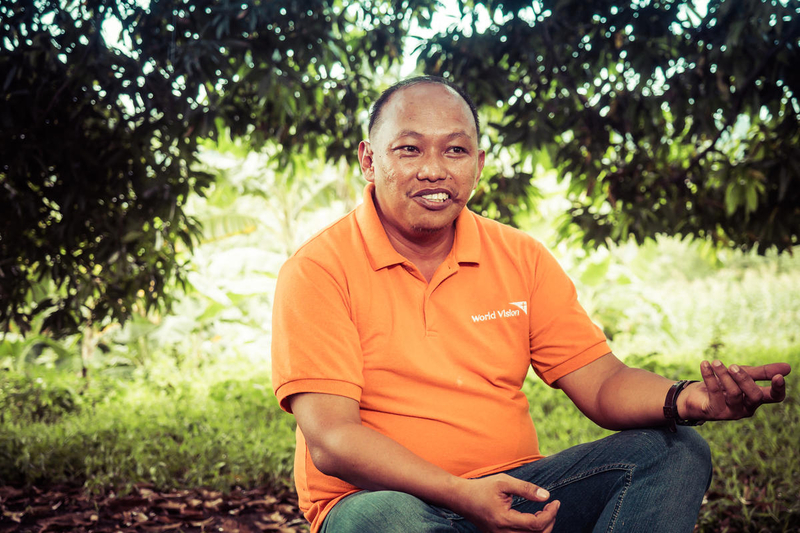
Beginnings of success
Noel Pellegrino first began working with kids in 2002. He’d been in college when he felt called to do something about the poverty that persisted in his homeland, the Philippines. Taking up social work, he graduated and began work with World Vision on child sponsorship, a program meant to help kids in impoverished or under-resourced communities.
“I [don’t think I had an] idea as to what is child sponsorship when I joined World Vision,” says present-day Noel, sporting the quintessential World Vision orange shirt. He still works with the organization and has since become an expert on the subject, even sponsoring a child of his own, Kyrie.
Today, Noel helps run a project in none other than Bukidnon — the province where Janvie and his grandmother worked all those years ago. Noel lives in Bukidnon during the week, riding a bus for eight hours to get home every Friday to spend time with his family, before returning on Sunday evening.
But back in 2002, Noel’s main mission was in Misamis Oriental. He was tasked with establishing a Village Children’s Association, a place where kids in the community could discover their rights, develop their voice, and learn how to advocate for themselves at all levels of government.
“Adults are planning for their lives, but [the children] are not consulted,” says Noel, of the rationale behind the association. “It’s very important we give them a venue to participate, and child sponsorship helps give this opportunity.”
It was here at the Village Children’s Association where Noel met a 9-year-old Janvie. He was a few years older than when he’d first signed himself up, and his tenacious personality had only grown stronger.
“Actually, he was very annoying,” says Noel, smiling. “He’s very talkative, and some of it, you [weren’t] able to understand because he talks really fast. He really speaks his mind out.”
Case in point — when it came time for the children to elect leaders for the association, Janvie nominated himself for president.
“I was just thinking about the position. I didn’t really think about the responsibilities attached to it,” says Janvie. “I just liked the term president.”
He was elected to the role, and with Noel as a mentor, Janvie began to take the role seriously. He learned how to structure the association and direct his cohorts, training others in the group to develop and run activities for all the children in the community. As time went on, opportunities emerged for Janvie to receive more formal training. He became a child sectoral representative, speaking to elected government leaders. Eventually, he was invited to join the National Anti-Poverty Commission, acting as a chairperson on the gender and development committee.
“I just encouraged Janvie,” says Noel, recalling his motivational words. “‘Be a child advocate. Go on helping other children because you are a leader right now. You can be someone else and you can help other children also achieve their dreams.’”
Noel’s encouragement made an impact on Janvie and helped him to think larger.
“Because of the exposure of World Vision, I became aware, and it opened a lot of perspectives to other places, cultures, and even opportunities,” says Janvie. “Maybe it seemed like a mere congress for children, but for me, it became a steppingstone to become who I am today.”
The exposure meant Janvie even got to travel, riding his first airplane with Noel by his side.
“For over four years, I accompanied Janvie to all of those events,” says Noel. “Over time, we became closer, and I was able to really see the potential of Janvie to be great someday.”
When he considers what local staff like Noel — whom he affectionately called Kuya or Brother Noel — mean to him, Janvie breaks down.
“They changed my life. During that time, I felt like they were my family,” he says through tears. “Every time I went to the World Vision office, I felt warmly welcomed. I really considered them as my elder brothers and sisters.”
He goes on. “There are children looking up to these people, the program staff of World Vision,” he says. “The program is an instrument, but these people working the program — they’re why I have the kind of burning passion that I have right now for [supporting] children in the community.”
Professional successes
Eventually, Noel moved on from the Misamis Oriental project, losing touch with Janvie until the two reconnected years later.
By now, Janvie had graduated the prestigious Philippine Maritime Institute and was a Global Shaper at the World Economic Forum. He’d participated in multiple forums to address the rights of youth in the Philippines and even begun his own work — Youth First Initiative Philippines — in his birthplace of Iloilo.
Noel was floored.
“I was so amazed and proud that I was not wrong with my perception of this little boy. He really reached high,” Noel says. Success stories like Janvie’s continue to fuel Noel’s own desire to support kids in the community, despite the hurdles.
“There have been so many ups and downs. So many times, I’m tempted to just move to some other work,” he says. “And yet, when I see children doing these things — advocating for other children, training children to be leaders — it gives me some inspiration to really continue for them. To give them opportunities to be heard.”
“I still see potential in children,” he adds. “I think there are lots of children that will be like Janvie.”
As Janvie walks through Misamis Oriental, it’s clear there are already children like him who have realized their potential. Janvie arrives at his old primary school to catch up with a former teacher, when he recognizes a familiar face in another classroom.
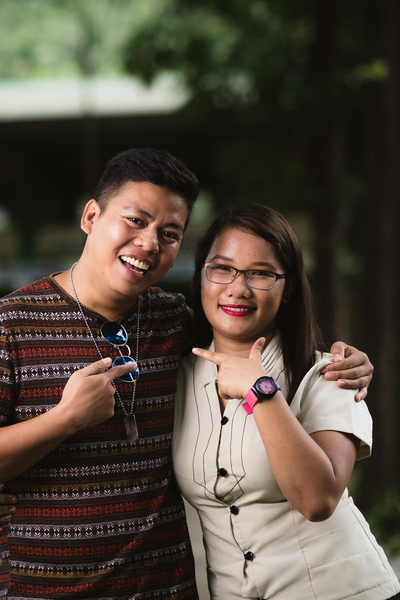
“Haziel!” he calls out to a woman speaking to room full of first-graders. A surprised grin breaks out on her face before she walks over, the two embracing excitedly.
Haziel Javier Iapuhapu, 25, was also a sponsored child in Misamis Oriental. She participated in the program from fourth grade until the end of high school, and it was through program activities that she met Janvie.
“Janvie was very friendly and kind,” says Haziel, recalling her first impression of him. “He was one of my friends from elementary through to high school, where he was our class president. He was a natural leader.
“I am a teacher because of World Vision. My sponsored family gave me the vision to study hard, and now I am a teacher, so I am very proud.”
Like Janvie, Hazel was abandoned by both of her parents. Her father denied her from the time she was a baby, and her mother quickly remarried, leaving Haziel to grow up with her grandmother.
“We were very poor,” says Haziel. “My grandmother worked hard, but she was very thankful because World Vision supported us with school supplies, bags, uniforms, and shoes.”
Early on, Haziel knew she wanted to become a teacher so she could share her story and encourage students growing up under similar conditions to beat the odds.
“I always hope for them to be successful in life,” she says of her students. “That they will pursue their dreams, their ambitions. As a teacher, I will encourage them to study hard, work hard, to make them successful in life like me.”
And Haziel isn’t the only other success story in the neighborhood. Not far away, Janvie finds Jessa Gadian, another of his friends who was sponsored. Jessa, now 27, was Janvie’s vice president when the two led the Village Children’s Association.
“We became close because we were both officers, and we went to the activities and the congress meetings together,” she says. “I’m really proud of him, and happy seeing him achieve a lot.”
Jessa too, has made strides forward. She works at Del Monte Philippines as a standard control inspector, a role she credits the sponsorship program with priming her for.
“I’m really thankful to World Vision,” she says. “I’ve experienced a lot and learned a lot that made me who I am right now.”
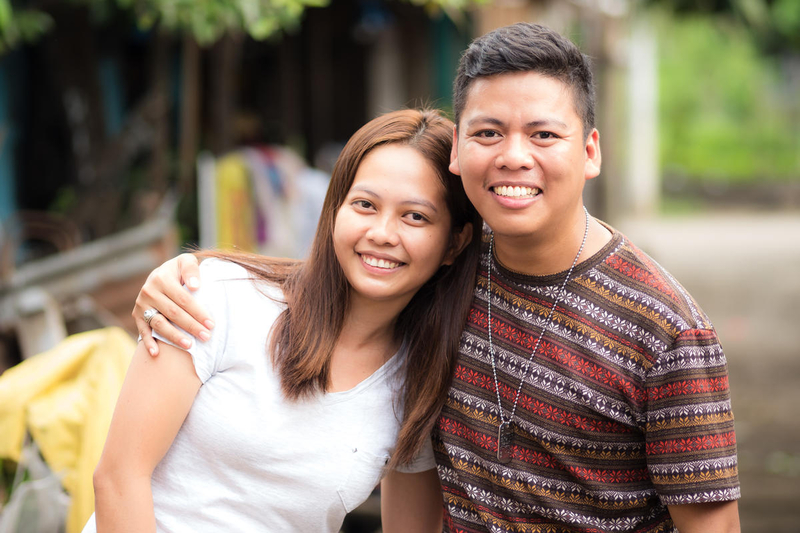
Even as Janvie says goodbye to Jessa, a group of young men emerge from a nearby basketball court, waving and calling his name. He strides over, giving them each a warm hello.
“They were part of the Village Children’s Association with me,” says Janvie. They snap a few photos together before shaking hands goodbye.
It’s clear that things have changed from the days when Janvie struggled to find friendship with his peers in Misamis Oriental. He admits that before sponsorship, he felt isolated from the other kids — more like an adult than a child. But after joining the program, the community he found began to restore his sense of self.
“I could interact with the other children as a normal child,” he says. “The sponsorship program made me feel normal. I [felt] that I have a family here.”
Child sponsorship’s impact
One person that felt like family, despite their extreme distance, was Janvie’s sponsor, a teacher whose letters impacted Janvie deeply.
“[Up to] last year, I was still reading that letter,” he says. “I can still remember the first line she wrote, ‘I am sorry that it took me a while to send you a letter, but please keep in mind that you are in my heart.’” Janvie remembers that she asked about what he wanted to be when he grew up and promised that she was praying for him.
“Who is this anonymous person who would actually pray for me?” says Janvie, tears springing to his eyes as he remembers her. “If not for her praying for me and supporting me through the sponsorship program, I couldn’t imagine the kind of life I’d have right now.”
In fact, Janvie imagines not much would have changed from his days on the sugarcane plantation, had it not been for her support.
“I think I’d still be working on a sugarcane plantation, or if not, I’d be a farmer right now,” he says. Noel confirms that most kids at the start of the program don’t have exceedingly high hopes for themselves.
“We’d ask them, ‘What would like to be when you grow up?’ Most of their responses before are like, ‘I would like to be a farmer. I would like to plant some corn,’” he says. “But with sponsorship, their minds were opened. Later when we asked, some of them would say, ‘I would like to be a teacher, a policeman, an engineer, a doctor. Their minds were open to some greater opportunities.”
The kids weren’t the only ones whose horizons widened. Janvie’s grandmother — the same woman who’d worried her grandson would be abducted into the military — became a parent leader in the community.
“Her whole perspective changed because of all the capacity-building activities that World Vision provided to me and other children,” says Janvie. “She was the one who became super active, telling other parents to attend the weekly Bible studies and the monthly activities with the children. It was not only about me, but it was also about my grandmother.”
Today, Janvie has no shortage of opportunities in front of him. He travels frequently as a consultant and Global Shaper with the World Economic Forum and is busy preparing to launch his own social enterprise in Singapore. Since graduating from the sponsorship program, he’s moved back to Iloilo and is now building his own house. “Next to the airport, of course,” he says.
But even as his success multiples, Janvie has made giving back to children a regular part of his life. In addition to the consulting he does for both government and nongovernment agencies, he can now call himself a child sponsor, too.
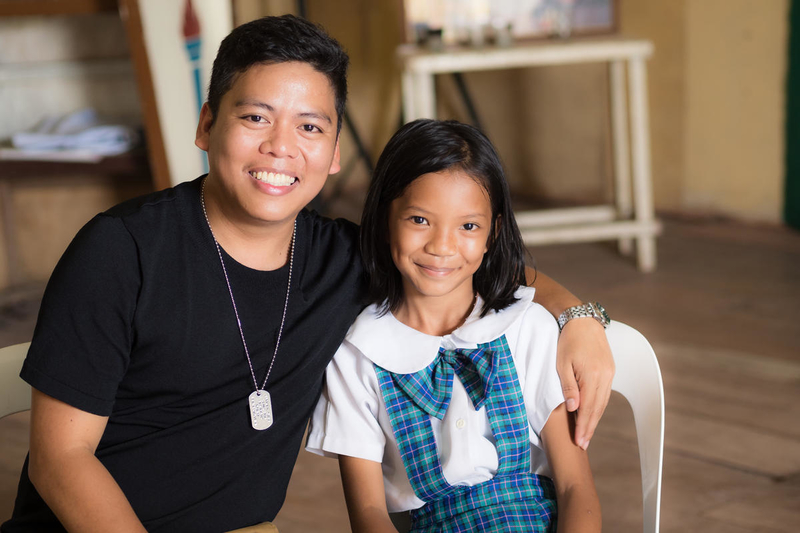
“Children like me need someone who will decide to change our future,” he says. “If you sponsor through World Vision, you’re not only changing the life of a child, but you’re changing the whole community.”
In a few days’ time, Janvie will travel to the province of Cebu, where his sponsored child lives. He’s excited to meet her in person and considers what advice to share as a former sponsored child himself.
“Enjoy life right now because you are still young, finish your studies, and just do what you really love to do,” Janvie says. He repeats the mantra he taught himself years ago.
“Do not make your temporary situation your permanent life.” He considers his words a little longer before adding, “Don’t be like me — be better than me.”
